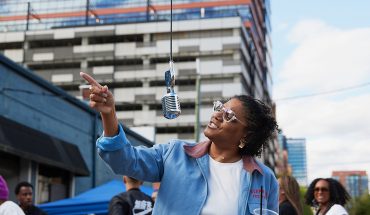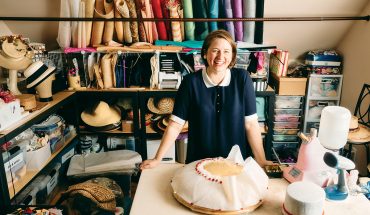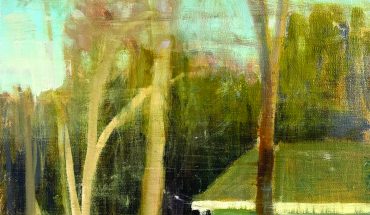Local nonprofit builds adaptive furniture
by Addie Ladner
Packing boxes, spaceships for kids, winter storage—it’s hard to conjure up more uses for cardboard than this. For Megan Vasko and her son Darius, three, who has autism, a certain chair made out of tri-wall cardboard has been life-changing. “You think it’s just a chair, right? But this chair has been miraculous for us and I can’t imagine our life without it,” says Vasko. The chair is a custom-made “floor sitter” painted to look like a John Deere tractor. It provides Darius with a secure, yet cheerful place to play, draw, watch a movie, or just calm down. Vasko says since the first day Darius sat in the chair, he’s been a different child. And according to Vasko, even though it’s technically made from cardboard, it’s in about the same condition as the day it was received. “If we introduce new toys or he needs to wind down, he wants to get into his chair,” she says. “We actually take it to church, and it’s the first thing he does every morning. He gets in his chair—it’s been through a lot!”
Lauren Zick and her mother Kati feel similarly about another cardboard chair that was made specifically to fit into a sled. Lauren, nine, has cerebral palsy. One of the only ways for her to experience the joys of sledding was to be on the sled lying down or with someone behind her. “She doesn’t quite have the core strength to sit on a sled on her own but she wanted to be able to sled independently,” Kati Zick says. Lauren’s brother, inspired by a school project, had the idea to build her a customized chair that could fit into the sled and hold his sister up straight. “We used it the first time it snowed that year. She got to go on her first solo sled down a hill and she was smiling and laughing. It was so amazing,” says Zick.

These custom-made cardboard creations can be found throughout various homes in the Triangle and are all thanks to two Wake Forest neighbors and friends Jim McAgy and John Mainey. In 2017, they founded the Triangle-based nonprofit, Made4Me. The two are on a mission to help any child or adult with special needs by providing them access to specialized adaptive furniture and equipment. All 70 plus pieces of equipment and furniture they’ve designed and built since the organization’s inception have been done out of home garages and are derived mainly from a strong try-wall type of cardboard.
Modeled off of a nonprofit McAgy discovered in New York City, the adaptive furniture ranges from easels for kids with visual impairment, to step stools, exercise benches, chairs, sleep wedges for babies to prevent reflux and floor sitters to help with core stability. “Mobility is key for us. We want to make people’s everyday living a little easier and to feel included in society,” says Mainey.
Both Mainey and McAgy have children with special needs, and the two know how financially and emotionally draining caring for those loved ones can be. They wanted to give back. “A lot of these types of items are hard to find and are expensive. Private insurance doesn’t cover it and it can take months to get, and then you get it and it doesn’t fit the need,” Mainey says. What Mainey and McAgy do through Made4Me is address those needs directly. “We come to them, we meet on their turf and we don’t ask for money except for a donation if they want to,” McAgy says. McAgy, originally from Detroit, Michigan, has an extensive background in the architectural woodworking business. Mainey, originally from New York, is an industrial engineer. The duo is a textbook pair for executing the build of this custom furniture and equipment. Each piece is made different for each person based on their individual needs and all the materials used are donated, allowing them to provide to families at no charge. “These families go through enough, how can we charge them? We can’t,” McAgy says.
Making things from cardboard may seem simple, but Mainey says that these aren’t your run-of-the-mill cardboard makings. “It’s a four-week process and everything is built from scratch. We take about twenty measurements of our clients and decide on an item that will make their life or their caregiver’s life easier,” he says. Though they don’t turn anyone away, all their work so far has been done for youth, ranging from age seven months to 18 years. The two like to take the time to make the pieces appealing to the child or teen and will often add their favorite colors, patterns or characters to the finished product. They involve therapists in the process as well, and each item is designed with safety as a priority, incorporating elements such as rounded corners, straps for security and non-skid bottoms.

The benefits of building adaptive equipment and furniture from this type of cardboard are tremendous. Its lighter, making it easier on the user and caregiver, and it costs significantly less. “What they make is very durable and lasts a long time. We like to use them to show patients what they can have at home,” says Jennifer Mock of Abilitations Children’s Therapy. Mock, also a Made4Me board member, says often times insurance doesn’t cover adaptive equipment because it might not be “medically necessary.” “We often have kids and families that have regular insurance but it doesn’t cover what they need so families are spending an arm and a leg trying to find lending and a loan for this equipment. They [Mainey and McAgy] have really carved a niche for people who can’t afford these things and they customize it so nicely so patients always really love it.”
McAgy says they’ve received 100 percent client satisfaction and hope to attract more volunteers and donations to expand their reach. The duo says they hope to help the 1 in 5 individuals living with disabilities in the state. Word is spreading much farther than the state though; they’ve had requests come from as far as Haiti and Africa. At the same time, the two continue to perfect and expand their portfolio. McAgy says, “Each piece we try to do a little better, we like to over-engineer. And we always get a tear on that third and final meeting when we deliver the finished product, that’s my favorite part. That’s the most rewarding.”



